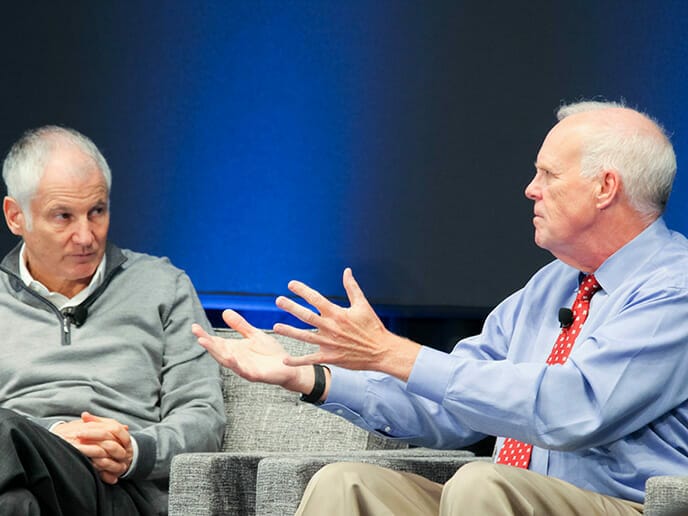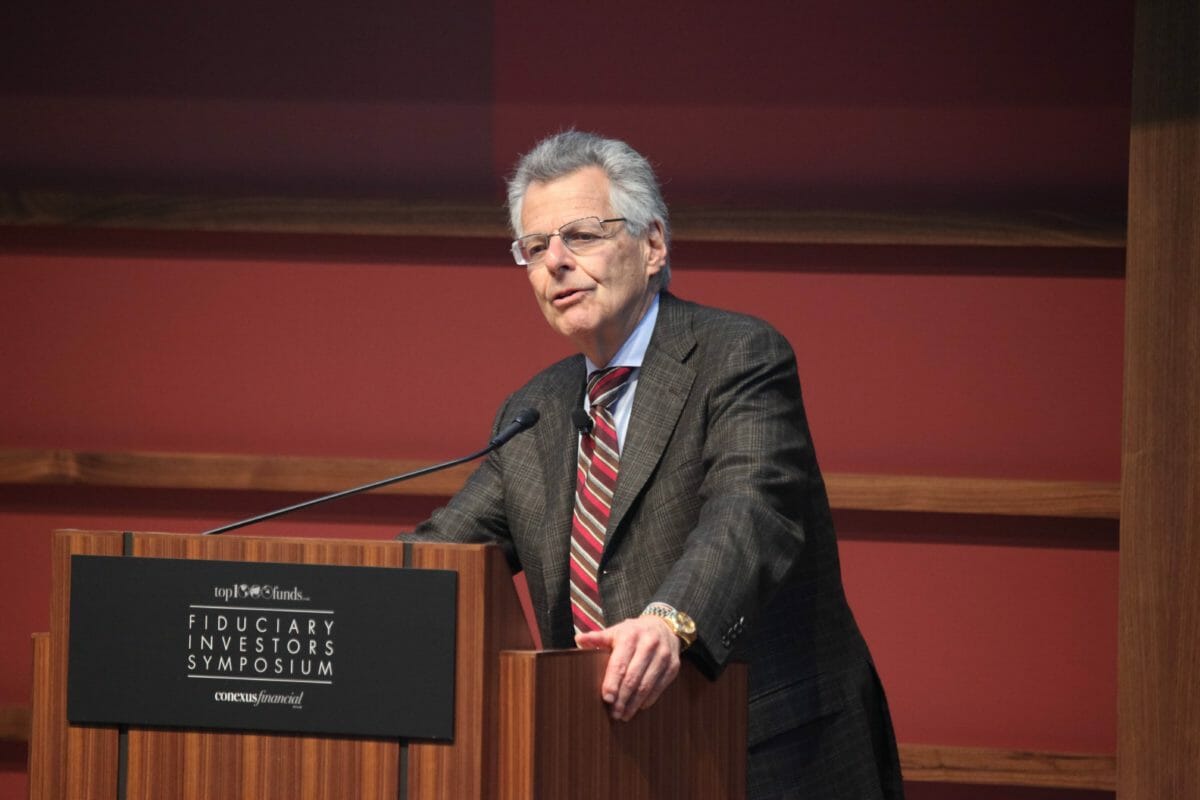John Hennessy, the chair of Alphabet and former president of Stanford University spoke to delegates at the Fiduciary Investors Symposium about the evolution of the internet, the mistakes and successes of Silicon Valley and where the industry is headed. Listen to his Q&A with Professor of International Affairs at Princeton University and Fellow at the Hoover Institution at Stanford, Stephen Kotkin

AI now dominates research and investment in Silicon Valley, John Hennessy told the Fiduciary Investors Symposium at Stanford University.
Innovation clusters as new ideas appear, Hennessy, a computer scientist, academician, the chair of Alphabet and former president of Stanford University told delegates. In the early ’80s it was around the PC, 10 years later, it was the internet. Today it is AI, evident in Alphabet’s decision to set up ‘AI First’ five years ago and move the technology centre stage. A recent catalyst, Hennessy said, was when Google DeepMind’s AI program AlphaGo beat world champion Lee Sedol at Go, the ancient and complex game of strategy and intuition.
“That program made moves that any high-playing Go player would have said were outstanding,” Hennessy said.
He said AI posed ethical questions and called for standards on developing how the technology is used, clarifying what it should and shouldn’t support.
Yet Hennessy’s view of Silicon Valley’s growth and the global businesses that have spun out of Stanford via one-car garages, give him cause for some regret.
“We made one really big mistake,” he told delegates. During research and experimentation into payment for online content, an idea around micro payments gained traction. In the model, small amounts of content would be free but if users wanted more, they paid. However, the idea lost ground to a belief that information should be free and later, the advertising model took hold. I wish we had put something in place that allowed a better model for paying for content, he said.
Need for security
Security and cybercrime remain key issues for the internet, Hennessy said. He called phishing – sending fraudulent emails to collect passwords and other personal information – “the really big hole” and said that once fraudsters have got behind corporate and institutional firewalls, they “can hit much harder” and, “like termites in a house”, are difficult to get rid of. The average time between a hacker breaking in and being identified is 100 days, during which they have “sucked up information” and victims haven’t begun to understand what is stolen, he said.
Users need to be able to dial up privacy, accepting that if they choose to be wholly private some services will not be available. Google Maps is not going to work if you don’t want to tell it where you are, he said.
Removing fake news and hate speech is also challenging, Hennessy said. Screening videos on YouTube for hate speech led to screening out archive videos of Hitler because they also contained hate speech, taking out original and important source material in the process.
“We’ve got to figure out new technologies to grapple with this,” he said, adding that technology’s ability to change lives and affect public opinion has emerged so quickly, the industry is only just catching up with its responsibilities.
Hennessy told delegates that Google set up Alphabet to allow it to diversify and open new business lines outside the “mother ship”. Companies with successful core products and dominant market positions often failed to invest and nurture future growth, he said. They wait until the core business begins to plateau; then they make the investment but it’s too late. He said Warren Buffett’s recruitment of chief executives to Berkshire Hathaway companies on the promise of delegating complete control and management of the business has now become a key model at Alphabet, too.
When Stanford was founded, it didn’t have enough students to fill the institution. Since then, its reputation for entrepreneurship and taking risks has led it to thrive and attract people with the ability to turn academia into profit. Yet Hennessy noted that today Silicon Valley is in danger of losing the people and environment that have nurtured its success. He cited Yahoo!’s early days to illustrate the issue.
“I remember going to see the prototype for Yahoo. They had offices in a trailer and were building it in their spare time,” he recalls. Today, the housing crisis and high living cost are affecting the ability of students and entrepreneurs to live in the area, he said.
China concerns
Hennessy also told delegates of his concerns about China’s continued censorship of the internet and the gathering pace of AI investment.
“China is investing more in AI than any other country in the world,” he said, noting the “snooping” potential this gives the government, and the possibility of its manifestation in national defence via robot soldiers or autonomous vehicles.
“This is doable in the not so distant future,” Hennessy warned. “There are bad uses of AI, and a global security threat that exists with use of this technology.”



